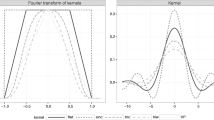Abstract
The paper studies the performance of deconvoluting kernel density estimators for estimating the marginal density of a linear process. The data stem from the linear process and are partially, respectively fully contaminated by iid errors with a known distribution. If 1−p denotes the proportion of contaminated observations (and it is, of course, unknown which observations are contaminated and which are not) then for 1−p ∈ (0, 1) and under mild conditions almost sure deconvolution rates of orderO(n −2/5(logn)9/10) can be achieved for convergence in\(\mathcal{L}_\infty\). This rate compares well with the existing rates foriid uncontaminated observations. Forp=0 and exponentially decreasing error characteristic function the corresponding rates are of merely logarithmic order. As a by-product the paper also gives a rate of convergence result for the empirical characteristic function in the linear process context and utilizes this to demonstrate that deconvoluting kernel density estimators attain the optimal rate in the dependence case with exponentially decreasing error characteristic function.
Similar content being viewed by others
References
Carroll, R. J. and Hall, P. (1988). Optimal rates of convergence for deconvolving a density,J. Amer. Statist. Assoc.,83, 1184–1186.
Carroll, R. J., Spiegelman, C. H., Lan, K. K., Bailey, K. R. and Abbott, R. D. (1984). On errors-in-variables for binary regression models,Biometrika,71, 19–25.
Crump, J. G., and Seinfeld, J. H. (1982). A new algorithm for inversion of aerosol size distribution data,Aerosol Science and Technology,1, 15–34.
Csörgö, S. (1985). Rates of uniform convergence for the empirical characteristic function,Acta Sci. Math.,48, 97–102.
Dudley, R. M. (1978). Central limit theorems for empirical measures,Ann. Probab.,6, 899–929. (Correction: ibid. Dudley, R. M. (1978). Central limit theorems for empirical measures,Ann. Probab.,7, 909–911).
Fan, J. (1991a), On the optimal rates of convergence for nonparametric deconvolution problems,Ann. Statist.,19, 1257–1272.
Fan, J. (1991b). Asymptotic normality for deconvolving kernel density estimators.Sankhyã Ser. A,53, 97–110.
Fan, J. (1992). Deconvolution with supersmooth distributions,Canad. J. Statist.,20, 155–169.
Fan, J. and Masry, E. (1992). Multivariate regression estimation with errors-in variables: Asymptotic normality for mixing processes,J. Multivariate Anal.,43, 237–271.
Fan, J. and Troung, Y. (1993). Nonparametric regression with errors-in-variables,Ann. Statist.,21, 1900–1925.
Fan, J., Troung, Y. and Wang, Y. (1990). Measurement errors regression: A nonparametric approach, Institute of Statistics Mimeo Series, No. 2042, University of North Carolina, Chapel Hill.
Hesse, C. H. (1987). Limit theorems for linear processes and applications, Ph.D. Dissertation, Dept. of Statistics, Harvard University.
Hesse, C. H. (1990). Rates of convergence for the empirical distribution function and the empirical characteristic function of a broad class of linear processes,J. Multivariate Anal.,35, 186–202.
Huber, P. J. (1981).Robust Statistics, Wiley, New York.
Karunamuni, R. J. and Mehra, K. L. (1990). Improvements on strong uniform consistency of some known kernel estimates of a density and its derivatives,Statist. Probab. Lett.,9, 133–140.
Liu, M. C. and Taylor, R. C. (1989). A consistent nonparametric density estimator for the deconvolution problem,Canad. J. Statist.,17, 427–438.
Masry, E. (1991a). Multivariate probability density deconvolution for stationary random processes,IEEE Trans. Inform. Theory,37, 1105–1115.
Masry, E. (1991b). Regression estimation with errors-in-variables for stationary processes, Tech. Report,173, Dept. of Electrical and Computer Engineering, University of California, San Diego.
Masry, E. (1993a). Asymptotic normality for deconvolution estimators of multivariate densities of stationary processes,J. Multivariate Anal.,44, 47–68.
Masry, E. (1993b). Strong consistency and rates for deconvolution of multivariate densities of stationary processes,Stochastic Process Appl.,47, 53–74.
Masry, E. and Rice, J. A. (1992). Gaussian deconvolution via differentiation,Cand. J. Statist.,20, 9–21.
Mendelsohn, J. and Rice, J. (1982). Deconvolution of microfluorometric histograms withB-splines,J. Amer. Statist. Assoc.,77, 748–753.
Robbins, H. (1964). The empirical Bayes approach to statistical decision problems,Ann. Math. Statist.,35, 1–20.
Snyder, D. L., Miller, M. I. and Schultz, T. J. (1988). Constrained probability density estimation from noisy data,Proceedings of the 1988 Conference on Information Sciences and Systems, 170–172, Johns Hopkins University, Baltimore, Maryland.
Stefanski, L. A. (1990). Rates of convergence of some estimators in a class of deconvolution problems,Statist. Probab. Lett.,9, 229–235.
Stefanski, L. A. and Carroll, R. J. (1990). Deconvolving kernel density estimators,Statistics,21, 169–184.
Tukey, J. W. (1960). A survey of sampling from contaminated distributions,Contributions to Probability and Statistics (ed. I. Olkin), Stanford University Press, Stanford.
Zhang, C.-H., (1990). Fourier methods for estimating mixing densities and distributions,Ann. Statist.,18(2), 806–831.
Author information
Authors and Affiliations
Additional information
This work was partially supported by a grant from the Deutsche Forschungsgemeinschaft.
About this article
Cite this article
Hesse, C.H. Deconvolving a density from contaminated dependent observations. Ann Inst Stat Math 47, 645–663 (1995). https://doi.org/10.1007/BF01856539
Received:
Revised:
Issue Date:
DOI: https://doi.org/10.1007/BF01856539



